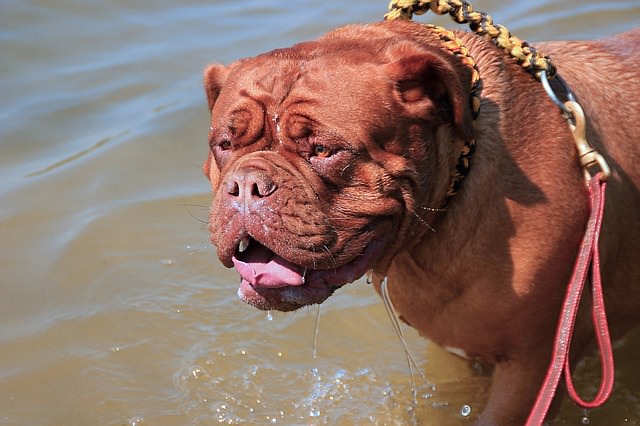We are aware of the dangers of sun exposure for ourselves and we hear frequently about skin cancers and the damaging effects of sun for people. The ultraviolet light radiation present in the light from the sun is the cause of the skin damage. Most of us have probably even experienced painful sunburn, so we would like to protect our dogs as much as we can. Sunscreen is recommended for humans to reduce the harmful effects, but what about for dogs?

There is some good news along these lines. Fortunately, many dogs have significant epidermal pigmentation and hair covering that protects most of their bodies. Nature has provided for animals in this way, so in a typical dog, the greatest risk for sun exposure is only in thinly haired areas, like the bridge of the nose or any area with less pigmentation, like the belly and flanks. But then mankind came along and modified what nature had so carefully wrought. We chose to breed dogs that have less hair on certain parts of their bodies or even no hair at all, like the Chinese Crested Dog.

So the bad news is that sun exposure for dogs (just like people) can cause trouble. Solar dermatitis (sunburn) is caused by direct damage to the skin from the ultraviolet light. Sunburn will cause redness mostly in areas where there is less hair and can eventually lead to other more serious issues, including pre-cancerous and cancerous lesions. Dogs with long, light colored and thinly haired noses are most at risk, like Collies and Australian Shepherds. Sunburn is not something that should be taken lightly, as it can mimic other more serious diseases, so if you notice reddening of your dog’s skin, you should see your veterinarian.
There are other environmental risk factors too, like living in an area of high elevation or region with increased sunlight. If your dog spends a lot of time outside, his risk of sun induced skin issues is greater. Some dogs really enjoy lying in the sun, even on their backs with their sparsely haired abdomen exposed.

The bottom line is that if you have a light colored (or lightly coated) dog who spends a lot of time outdoors or likes to sunbathe, he could benefit from the application of sun block to these vulnerable areas. Ask your veterinarian which products he/she recommends and also importantly, if you notice something unusual on your dog’s skin-redness, flaking, oozing or scabbing, contact your veterinarian right away. Early detection and treatment of sun induced trouble are critical to keeping your dog safe, happy and healthy.
Do you like learning about dogs? I love sharing about them! Find me on Facebook for more! Click here.
- Werner, Alexander. Top 5 Sun-induced Skin Lesions in Dogs. Clinicians Brief. 2014 June. 21-23.

